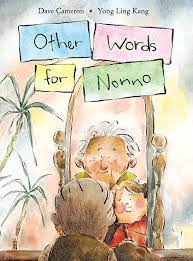Other Words for Nonno

Other Words for Nonno
On Saturday afternoon, Jill met her grandfather for their weekly walk. They always followed the same route, beginning with a forest trail that ended at a lake.
“Away we go,” Nonno said. “Into the green to get to the blue!”
As they went, Jill and Nonno gave different names to things they saw.
“Hummingbird,” Jill said.
“Sugar-drinker!” Nonno said.
“Termites,” Nonno said.
“Forest-eaters!” Jill said.
Jill’s Nonno lives at Sunrise Manor where she visits him every Saturday for a walk into the forest by a lake and through town back to his home. A hallmark of their outings has always been the wordplay the two share, but recently Jill has noticed that her grandfather seems to have lost his words. When Jill’s mom confirms that sometimes Nonno can’t find the words he is thinking of, Jill devises a plan that she hopes will help.
Cameron writes empathetically about the effects of dysphasia, the partial loss of language commonly referred to as aphasia. Jill’s solution (a series of flash cards that she tapes up on objects along their walk) is a clever one that should strike a chord with young readers just beginning to read and write themselves. Kang’s digitally enhanced watercolour and pencil artwork employs a realistic style that is distinguished by cartoon-like facial features: dots and brief lines to suggest eyes, noses, and mouths. Greens and earth tones predominate, appropriate to the mostly outdoor setting. The text leaves to readers’ imaginations much of Nonno’s response to Jill’s efforts, probably wise given the uncertain prognosis for aphasia in many elderly, but the joy in their close relationship remains clear.
Kay Weisman is a former youth services librarian at West Vancouver Memorial Library and the author of If You Want to Visit a Sea Garden. (www.cmreviews.ca/node/1693)
